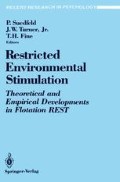Abstract
Many retrospective reports of highly creative scientists, artists, and poets suggest that a hypnogogic state of consciousness may be especially fruitful for the initial stages of creative scientific research or new works of art. Perhaps the most famous of these reports is the often cited discovery of the Fuchsian functions in mathematics, by Poincare, who discovered the existence of these functions during a state of light sleep. “For fifteen days I strove to prove that there could not be any functions like those I have since called Fuchsian functions. I was then very ignorant; every day I seated myself at my work table, stayed an hour or two, tried a great number of combinations and reached no results. One evening, contrary to my custom, I drank black coffee and could not sleep. Ideas rose in crowds; I felt them collide until pairs interlocked, so to speak, making a stable combination. By the morning I had established the existence of a class of Fuchsian functions, those which come from the hypergeometric series; I had only to write out the results, which took but a few hours” (Vernon, 1970, p. 81). Kekule, too, is reported to have discovered the structure of benzine during a dream in which he viewed an image of a snake biting its own tail, which provoked the insight of the ringlike structure of benzine.
Access this chapter
Tax calculation will be finalised at checkout
Purchases are for personal use only
Preview
Unable to display preview. Download preview PDF.
References
Bowers, K.S. Hypnosis for the seriously curious. New York, NY: W.W. Norton & Company, 1976.
Bowers, K.S. Memory, intuition, and Meno’s paradox. Presented at the American Psychological Association, August 1987, New York.
Bruner, J. On knowing. Cambridge, MA: Belknap Press of Harvard University Press, 1979.
Budzynski, T.H. Biofeedback and the twilight states of consciousness. In: G.E. Schwartz & D. Shapiro (Eds.) Consciousness and self-regulation: Advances in research. New York, NY: Plenum, 1976, Vol. 1, 361–385.
Forgays, D.G. & Belinson, M.V. Is flotation isolation a relaxing environment? Journal of Environmental Psychology, 1986, 6, 19–34.
Haken, H. Synergetics: An introduction to nonequilibrium phase transitions and self-regulation in physics, chemistry, and biology. Berlin: Springer-Verlag, 1983.
Kelso, J.A.S. & Scholz, J. Cooperative phenomena in biological motion. In H. Haken (Ed.) Computer systems — Operational approaches in neurobiology, physical systems, and computers. Berlin: Springer-Verlag, 1985, 124–149.
McNair, D.M., Lorr, M. & Droppleman, L.F. Profile of Mood States (Manual). San Diego, CA: Educational and Testing Services, 1971.
Pattee, H.H. Discrete and continuous process in computers and brains. In: M. Conrad, W. Guttenger & M. Dal Cin (Eds.) Physics and mathematics of the nervous system. Berlin: Springer-Verlag, 1974.
Poincare, H. Mathematical creation. In P.E. Vernon (Ed.) Creativity. Markham, Canada: Penguin, 1970, 77–88.
Shepard, R.N. & Cooper, L.A. Mental images and their transformations. Cambridge, MA: MIT Press, 1986.
Shepard, R.N. & Metzler, J. Mental rotation of three-dimensional objects. Science. 1971, 171, 701–703.
Shore, E. Sensory deprivation, preconscious processes and scientific thinking. American Journal of Orthopsychiatry, 1971, 41 574–580.
Suedfeld, P. Changes in intellectual performance and susceptibility to influence. In J.P. Zubek (Ed.) Sensory deprivation: Fifteen years of research. New York, NY: Appleton-Century-Crofts, 1969, 126–166.
Suedfeld, P. Restricted environmental stimulation: Research and clinical applications. New York: Wiley & Sons, 1980.
Suedfeld, P. APA presidential addresses: The relation of integrative complexity to historical, professional and personal factors. Journal of Personality and Social Psychology, 1985, 49 1643–1651.
Taylor, J.W. The effects of flotation restricted environmental stimulation therapy on learning subjective evaluation and EEG measurements. In T.H. Fine & J.W. Turner, Jr. (Eds.) Proceedings of the First International Conference on REST and Self-Regulation. Toledo, OH: IRIS Publ., 1985, 76–85.
Wallace, M.D. & Suedfeld, P. Leadership performance in crisis: The longevity-complexity link. Unpublished MS, Univ. of British Columbia, Vancouver, 1986.
Editor information
Editors and Affiliations
Rights and permissions
Copyright information
© 1990 Springer-Verlag New York Inc.
About this chapter
Cite this chapter
Metcalfe, J., Suedfeld, P. (1990). Enhancing the Creativity of Psychologists Through Flotation REST. In: Suedfeld, P., Turner, J.W., Fine, T.H. (eds) Restricted Environmental Stimulation. Recent Research in Psychology. Springer, New York, NY. https://doi.org/10.1007/978-1-4613-9701-4_13
Download citation
DOI: https://doi.org/10.1007/978-1-4613-9701-4_13
Publisher Name: Springer, New York, NY
Print ISBN: 978-0-387-97348-7
Online ISBN: 978-1-4613-9701-4
eBook Packages: Springer Book Archive

